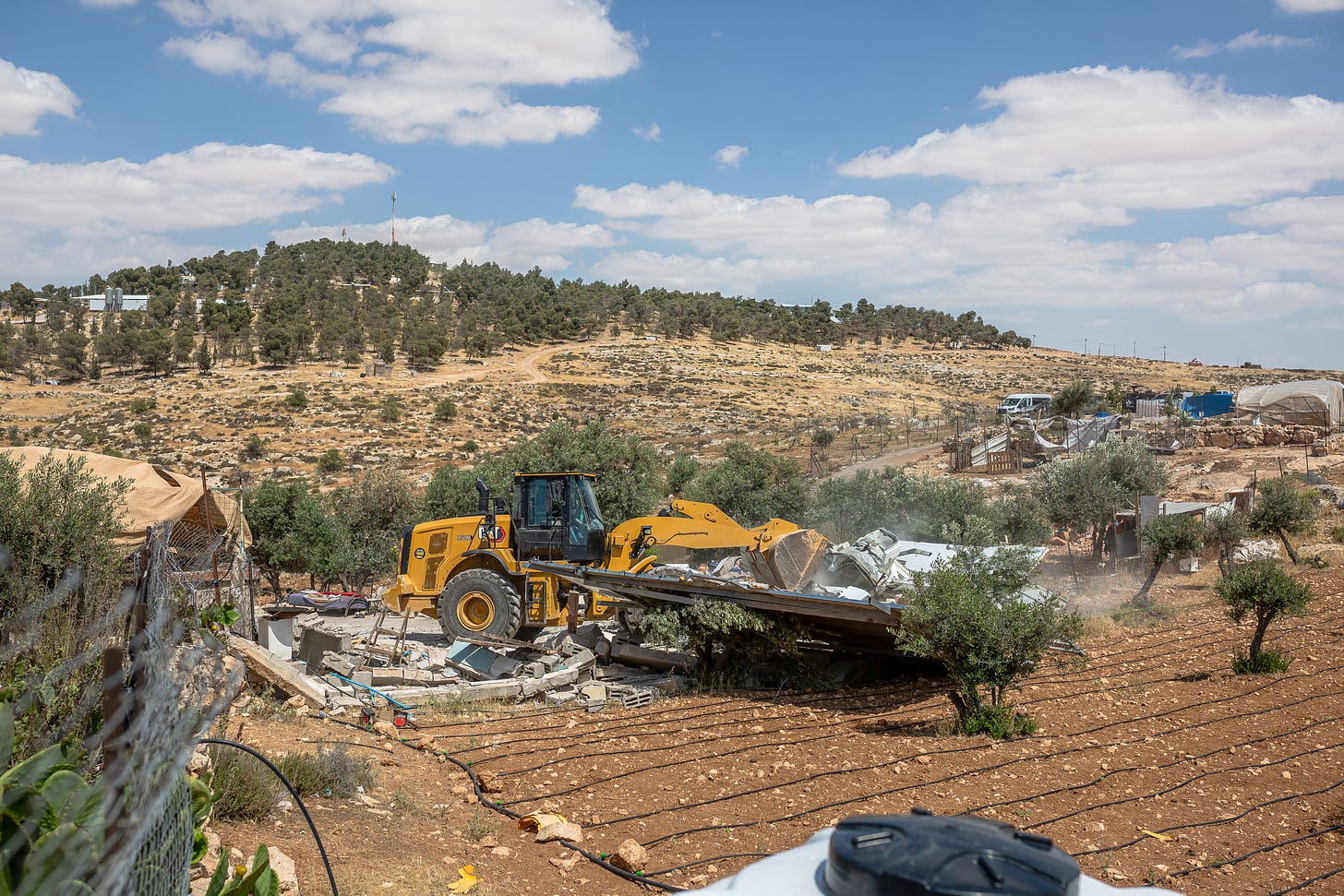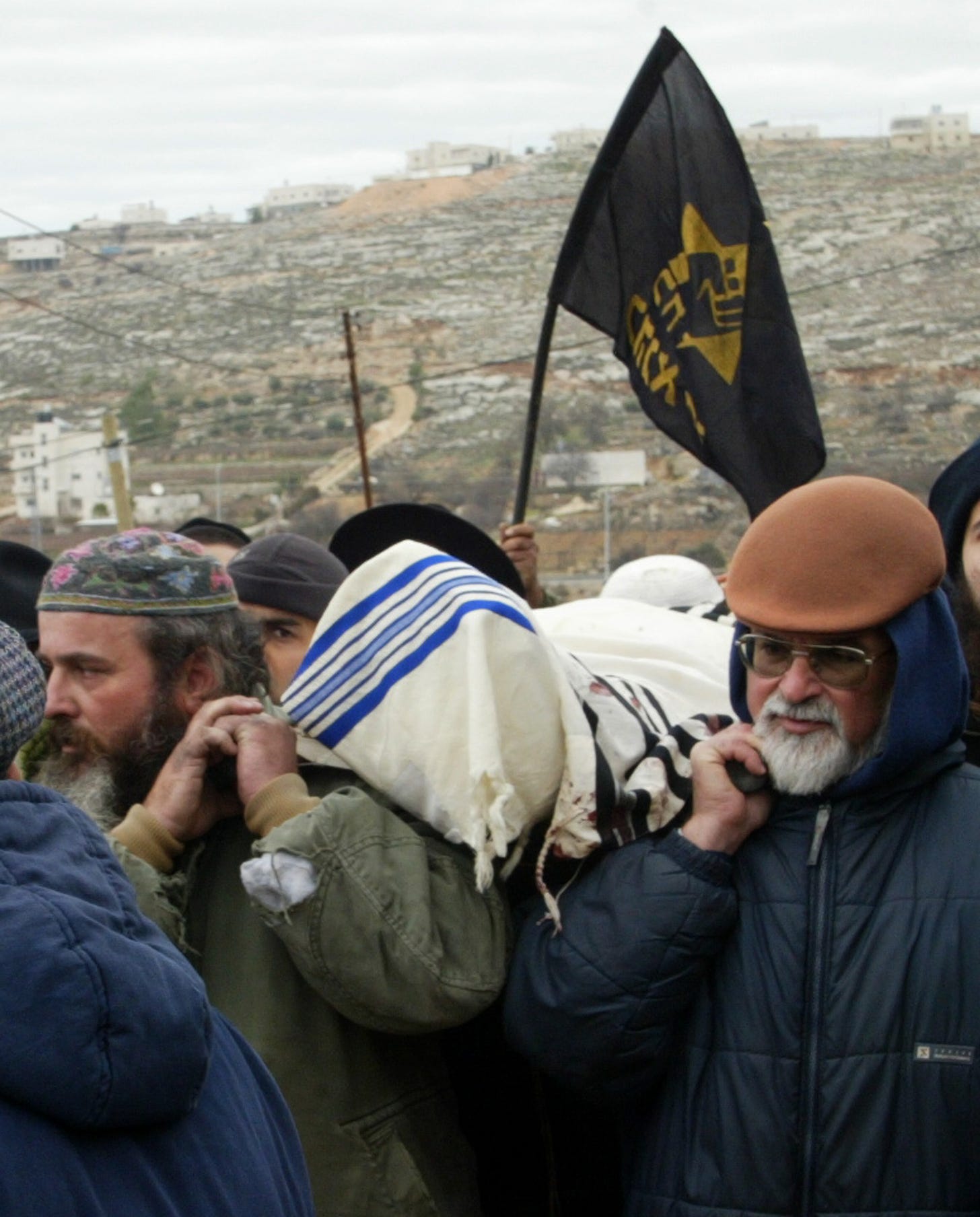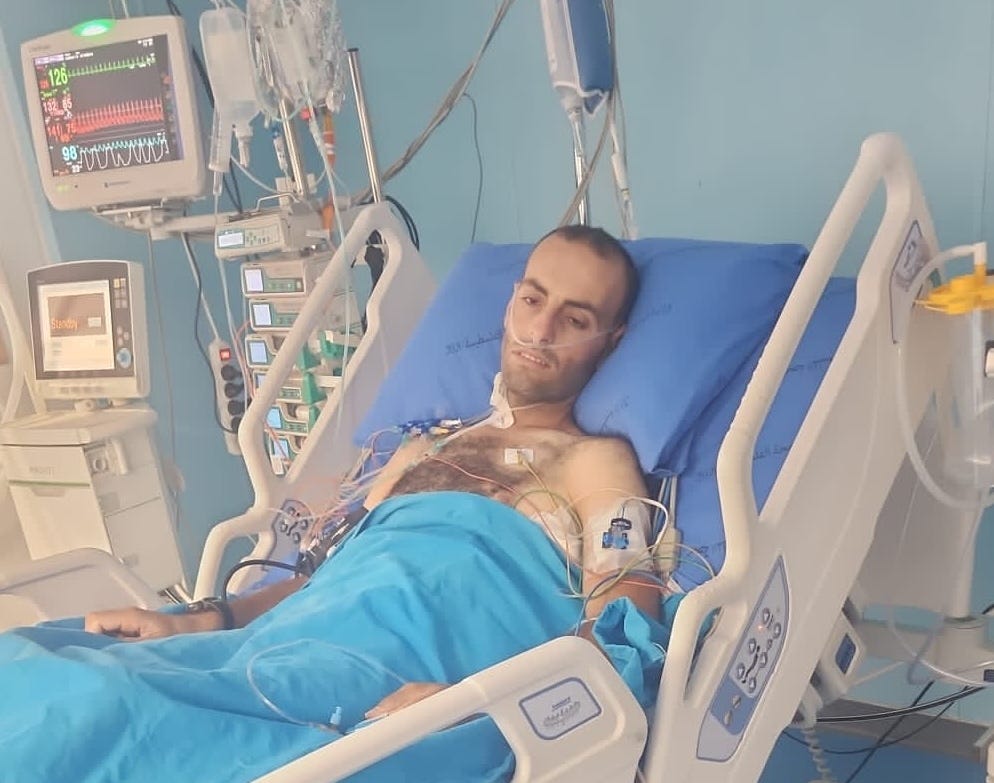https://zeteo.com/p/israeli-settler-violence-palestinian-masafer-yatta
~~ recommended by newestbeginning ~~
(NB note - you will have to click on the link above to see the video footage as it won't display here)
Jewish settler Yitzhak Nir does not deny shooting Zakaria al-Adra, a 28-year-old Palestinian father of four, on Oct. 13, 2023.
Nir, armed with an Israeli military-issued assault rifle, and at least one other settler left the illegal Ma’on Farm outpost in the occupied West Bank late that morning, walked 350 meters down a rugged hillside, and entered the neighboring village of At-Tuwani, according to court documents.
Al-Adra had been praying at the local mosque when he heard a commotion outside, prompting him and several others to go out and investigate.
What happened next was captured on video. Nir emerges from behind a large boulder and strides aggressively down the road toward al-Adra, striking him in the chest with the barrel of his rifle. Al-Adra raises his arm and then quickly lowers it, at which point Nir fires. Al-Adra collapses immediately, stands up, and then falls again, clutching his abdomen as blood begins to pool on the road. Screams can be heard in the background. Nir retreats slowly up the hill, his gun still trained on al-Adra.
“Everything turned very dark,” al-Adra said months later. “I felt the blood pouring out of my body, as if all of it was leaving me, and I was becoming lighter. I thought of my children, and I was sure, ‘This is the last moment of my life.’”
An Israeli military checkpoint prevented an ambulance from reaching the village, so al-Adra’s cousin drove him to the hospital while he hemorrhaged blood in the backseat. What should have been a 10-minute drive turned into a 40-minute journey due to Israeli roadblocks, al-Adra and his cousin said. He nearly bled to death before reaching the hospital, where he would spend the next 82 days.
Within a day of the shooting, the video of it went viral. A police investigation, according to court documents, named Nir as the shooter. Nir later claimed self-defense: Al-Adra, he said, intended to throw a stone. Ten months after the shooting, the police have made no arrests. Al-Adra and his family continue to live as neighbors with the man who shot him.
"I am not surprised, only ashamed," said al-Adra’s attorney, Eitan Peleg, an Israeli Jew. “This happens here every day.”
Decades Under Siege
Many At-Tuwani villagers bear the scars of beatings by violent settler mobs. The small farming community is one of 12 in Masafer Yatta, a windy region in the South Hebron Hills classified as Area C, placing it under full Israeli control. The area has been under a brutal siege for many decades: settlers and soldiers have cut off the town’s water and electricity, demolished critical infrastructure, annexed its olive groves, and harassed its sheep.
In the 1980s, Israel designated much of the area as an active military training and firing zone, with the goal of reserving the land for Jewish settlement. The Israeli government has forcibly evicted hundreds of households on the grounds that they were "illegally living in a military training area" – a move upheld by Israel’s Supreme Court in 2022 when it rejected a petition against the forced transfer of more than 1,000 Palestinians. This May, Zakaria al-Adra’s wife, Shoug, watched the military bulldoze her family home.

Before the Oct. 7 Hamas attack, Masafer Yatta was home to approximately 1,150 residents, though a yet unknown number of villages have been abandoned due to escalating settler violence. Israeli soldiers or settlers have killed more than 500 Palestinians across the West Bank under the cover of the war in Gaza. Dozens of armed Israeli settlers went on a rampage in the Palestinian village of Jit last week, reportedly killing a 23-year-old Palestinian man, wounding several others, and setting fire to Palestinian property. The UN has recorded more than 1,250 attacks by Israeli settlers in the West Bank since the war in Gaza began, but even before Oct. 7, the rate of violence was at an all-time high.
The escalation began after Israel’s 37th government, the most far-right coalition in the country’s history, was formed under Prime Minister Benjamin Netanyahu in late 2022. Finance Minister Bezalel Smotrich, one of numerous settlers in the current cabinet, had long been open about his desire for Israel to annex the West Bank. His broad powers over the region have increased since Oct. 7, as he has sought to bankrupt the Palestinian Authority and drive settlement expansion.
National Security Minister Itamar Ben-Gvir, in addition to arming “civilian security squads” with American assault rifles, has repeatedly led thousands of ultranationalist settlers to the Al-Aqsa Mosque compound in East Jerusalem, declaring Israel “in charge”— actions clearly intended to inflame tensions in the chronically volatile region. He has emboldened violent settlers, fighting against their arrests, referring to bands of rampaging settlers as “sweet kids,” and calling for a medal of honor for a settler who fatally shot a Palestinian teenager he accused of throwing rocks.
Against this backdrop, Yitzhak Nir shot Zakaria al-Adra nearly a year ago, etching himself into his family’s grim legacy of violence.
A Vow for Vengeance
Yitzhak Nir, 39, was raised within the most radical fringes of Israel’s far-right settler movement in the occupied West Bank.
His father and uncle, Shaul and Barak Nir, were sentenced to life in prison in 1984 for killing three and wounding 33 others in a shooting and grenade rampage at the Islamic College of Hebron. They were members of the Jewish Underground, which Israel considers a terrorist group, and accused of plotting to blow up five Palestinian buses and, later, the Dome of the Rock mosque in an attempt to incite its long-sought Holy War. Shaul Nir served seven years before then-President Chaim Herzog commuted his sentence and released him from prison, where settlers greeted him as a hero and carried him off on their shoulders. Shaul Nir and his wife were later wounded in a shooting attack in the West Bank.
Yitzhak Nir’s sister, Livnat, was married to Netanel Ozeri, a hero to many extremists in his own right. He mentored the violent “Hilltop Youth” settler group and was a prominent figure within the ultranationalist Kach movement, whose political party Israel had banned under anti-terrorism laws. The Kach party founder, Meir Kahane, had advocated for the creation of a biblically enshrined theocratic state. He used the campaign slogan, “Every Jew a .22,” and indeed, there was no shortage of guns on Hilltop 26, the illegal outpost Ozeri had established and moved his young family to in defiance of the Oslo peace process with the explicit goal of provoking a war that would end in the Palestinians’ expulsion.
Instead, on Jan. 17, 2003, two Palestinian teenagers shot him dead there, in the doorway of his family home, where he died with a gun in his hand. His funeral would become a symbol of the increasingly lawless settler movement.
The ceremony began with a series of incendiary speeches, including one by Shaul Nir, accusing Israeli police, soldiers, and politicians of being “animals” and “Nazis” and calling for settlers to take security measures into their own hands, according to media reports from the time. From there, it devolved into a violent spectacle.

During a procession from one hilltop to another, mourners torched Palestinian cars and homes and fought with police. Despite desperate pleas from Ozeri’s elderly parents, his widow ordered her late husband’s disciples to steal his body and parade it through Jerusalem so “the entire nation could see the results of terrorism.” A tug-of-war over the body ensued, leading to a wild chase between the police and over 200 mourners through Hebron’s muddy hills and vineyards, first on foot and then by car, with the body in tow. Livnat’s original plan, blocked by Israeli officials, had been to bury her husband next to the grave of his hero, Baruch Goldstein, the Brooklyn-born Hebron settler who massacred 29 Palestinians at the Cave of the Patriarchs mosque in 1994. Years earlier, Ozeri had edited a book of fawning poems and essays about Goldstein.
Netanel Ozeri had aimed to conquer the West Bank in his lifetime. But in his death, his father-in-law Shaul Nir and those who mourned him that day made a more direct demand that would be passed from one generation to the next: vengeance.

No comments:
Post a Comment